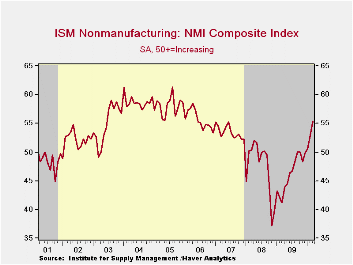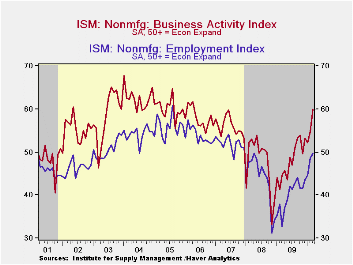 Global| Apr 05 2010
Global| Apr 05 2010U.S. ISM Nonmanufacturing Index Continues To Strengthen
by:Tom Moeller
|in:Economy in Brief
Summary
The service sector clearly is on the road to recovery. The Institute for Supply Management's (ISM) Composite Index for the service & construction sectors rose in March to 55.4 from 53.0 in February. It was the third consecutive [...]

The service sector clearly is on the road to recovery. The Institute for Supply Management's (ISM) Composite Index for the service & construction sectors rose in March to 55.4 from 53.0 in February. It was the third consecutive monthly indication of solid expansion and was the index's highest level since early-2006. Moreover, the series has risen considerably from a low of 37.2 late in 2008. The latest figure exceeded Consensus expectations for a reading of 54.0. Since the series' inception in 1997 there has been a 65% correlation between the level of the composite index in the nonmanufacturing sector and the q/q change in real GDP for the services and the construction sectors.
ISM surveys more than 370 purchasing managers in more than 62 industries including law firms, hospitals, government and retailers. The nonmanufacturing survey dates back to July 1997. The figures are available in Haver's USECON database.
The business activity index for the nonmanufacturing sector surged m/m to 60.0 which was the highest level since early-2006. The new orders index also rose considerably to 62.3, the highest level since 2005. Thirty-seven percent of respondents reported higher orders while only 14% reported them lower. Finally, the employment index rose to nearly break-even. The latest level of 49.8 was the highest level since April 2008 and was up sharply from the late-2008 low. Since the series' inception in 1997 there has been an 80% correlation between the level of the ISM nonmanufacturing employment index and the m/m change in payroll employment in the service-producing plus the construction industries.
Pricing power also improved to the strongest since September 2008 and was up sharply from the 2008 low. Thirty-two percent of respondents reported higher prices while just 5% reported them lower. At the worst, late in 2008, 41% reported lower prices. Since its inception ten years ago, there has been a 73% correlation between the price index and the q/q change in the GDP services chain price index.
Beginning with the January 2008 Nonmanufacturing Report On Business®, the composite index is calculated as an indicator of the overall economic condition for the non-manufacturing sector. It is a composite index based on the diffusion indices of four of the indicators (business activity, new orders, employment and supplier deliveries) with equal weights. The latest report from the ISM can be found here.


| ISM Nonmanufacturing Survey | March | February | January | March '09 | 2009 | 2008 | 2007 |
|---|---|---|---|---|---|---|---|
| Composite Index | 55.4 | 53.0 | 50.5 | 41.2 | 46.2 | 47.3 | 53.5 |
| Business Activity | 60.0 | 54.8 | 52.2 | 44.5 | 48.0 | 47.4 | 56.0 |
| New Orders | 62.3 | 55.0 | 54.7 | 39.4 | 47.9 | 47.0 | 54.8 |
| Employment | 49.8 | 48.6 | 44.6 | 32.8 | 39.9 | 43.8 | 52.0 |
| Supplier Deliveries (NSA) | 49.5 | 53.5 | 50.5 | 48.0 | 49.0 | 51.1 | 51.1 |
| Prices Index | 62.9 | 60.4 | 61.2 | 40.8 | 49.4 | 66.0 | 63.8 |
Tom Moeller
AuthorMore in Author Profile »Prior to joining Haver Analytics in 2000, Mr. Moeller worked as the Economist at Chancellor Capital Management from 1985 to 1999. There, he developed comprehensive economic forecasts and interpreted economic data for equity and fixed income portfolio managers. Also at Chancellor, Mr. Moeller worked as an equity analyst and was responsible for researching and rating companies in the economically sensitive automobile and housing industries for investment in Chancellor’s equity portfolio. Prior to joining Chancellor, Mr. Moeller was an Economist at Citibank from 1979 to 1984. He also analyzed pricing behavior in the metals industry for the Council on Wage and Price Stability in Washington, D.C. In 1999, Mr. Moeller received the award for most accurate forecast from the Forecasters' Club of New York. From 1990 to 1992 he was President of the New York Association for Business Economists. Mr. Moeller earned an M.B.A. in Finance from Fordham University, where he graduated in 1987. He holds a Bachelor of Arts in Economics from George Washington University.
More Economy in Brief
 Global| Feb 05 2026
Global| Feb 05 2026Charts of the Week: Balanced Policy, Resilient Data and AI Narratives
by:Andrew Cates






